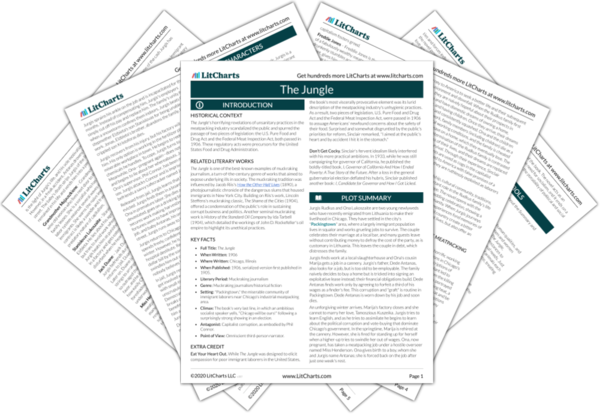Summary
Analysis
Jurgis's new incomes, both legal and illicit, allow him to adopt a more comfortable—and more decadent—lifestyle. Soon, the wage agreement between the packers and the unions expires. When the negotiations disappoint the unions, the workers go on strike. Jurgis asks Scully to find him a job during the strike, and Scully encourages Jurgis to work as a strikebreaking "scab." Scully's counsel surprises Jurgis, since it runs counter to Scully's public political positions.
Scully's advice demonstrates to Jurgis yet again that unscrupulous capitalists like Scully are motivated by nothing but pure self-interest—a fact that Jurgis has naively failed to understand completely. Jurgis is surprised to see that Scully has no real morals: his professed opposition to strikebreaking is just a political device to keep himself in power by appealing to the working class.
Themes
Working as a strikebreaker, Jurgis is well paid, but one day he ventures outside of the stockyard and is assaulted by strikers. The media blows this incident out of proportion to provide sympathetic coverage to the industrialists; the text sarcastically refers to Jurgis as a "new American hero." Soon, Jurgis is promoted to foreman in the killing rooms, where he oversees scab workers from across the country, many of whom are African-Americans imported from the South. As foreman, Jurgis learns to evade accountability, and begins accepting bribes from his workers.
The narrator again ironically praises Jurgis's double-dealing to show how biased reportage can fuel corruption. Meanwhile, Jurgis's involvement with graft alienates him from his fellow immigrant workers and erodes his morals still further.
Themes
Reconstructing a workforce proves too difficult for the packing magnates, and they yield to public pressure and renegotiate with the unions. The new deal states that there will be "no discrimination against union men" in the rehiring process, which disturbs Jurgis, because he may lose his job. However, the packers conspire not to hire union leaders, and the unions resume their strike in retaliation. An influx of new scabs from across the country heightens the tension of the strike, and Packingtown becomes still more violent, debauched, and squalid.
The packers' capitalist gambit has forced two separate workforces to compete against one another. This directs the working poor's resentment inward, instead of where it belongs: at the exploitative industrialists. As a result, Packingtown becomes an even more miserable and unwelcoming place.
Themes
After looting a bar with some policemen, Jurgis comes upon Phil Connor. He again attacks Connor and is sent back to jail. When he asks "Bush" Harper to help him avoid punishment, Harper tells him that Connor is a top man of Scully's. For fear of crossing Scully, Harper can only help Jurgis enough to lower his five hundred dollar bail to a sum Jurgis can afford, so that Jurgis can skip town. Jurgis pays a reduced bail of three hundred dollars and leaves with his last three dollars in his pocket.
Just as Jack Duane was sold out in Chapter 25, Jurgis, too, is left high and dry as soon as he falls out of favor. Although the graft system treated him well when he was on the inside, Jurgis's misstep—which can be described as remaining loyalty to his family (illustrated by his attack on Connor) rather than caring only about money (in which case he would have avoided attacking Connor)—makes him penniless once more.
Themes
Get the entire The Jungle LitChart as a printable PDF.













